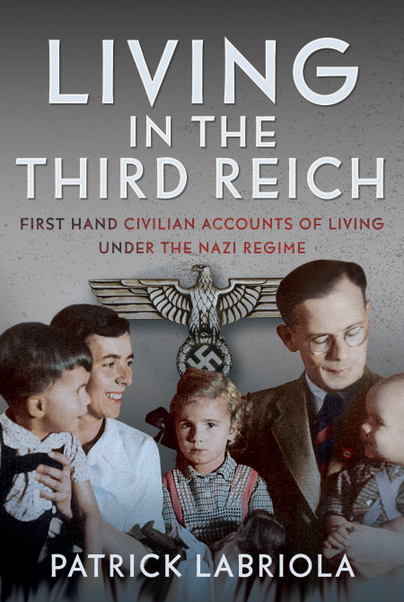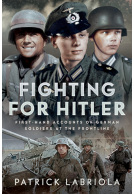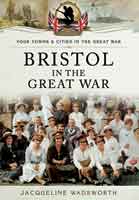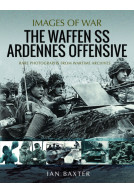Living in the Third Reich (Hardback)
First hand civilian accounts of living under the Nazi Regime
Imprint: Pen & Sword Military
Pages: 176
Illustrations: 30 mono illustrations
ISBN: 9781036124625
Published: 3rd July 2025
(click here for international delivery rates)
Order within the next 6 hours, 52 minutes to get your order processed the next working day!
Need a currency converter? Check XE.com for live rates
| Other formats available | Price |
|---|---|
| Living in the Third Reich eBook (9.0 MB) Add to Basket | £14.99 |
Living in the Third Reich intricately weaves together the personal stories of German historical witnesses across thematic chapters, covering diverse facets of the wartime experience. From the early years of National Socialism to the devastating bombings of German cities, these narratives are enriched with personal documents and photographs, vividly providing the human face of history.
This book is more than just a chronicle of events; it is a profound exploration of human suffering and memory. Each testimony contributes to a larger mosaic, unveiling the emotional and psychological landscapes of those who endured one of history's darkest periods.
Included are German perspectives on antisemitic violence, such as the Night of Broken Glass and the deportation of Jews. The book also contains accounts from those who witnessed allied bombings across Germany, and the civilians caught up in the Russian invasion. The book goes on to cover the aftermath of the war, with people displaced and some forced into labour, and life in post-war Germany.
The author's dedication to impartial presentation allows these stories to resonate on their own, providing a rare and invaluable perspective on the past. Years of painstaking research, translation, and editing have transformed this book into a treasure trove for scholars and general readers alike. It serves as a vital preservation of a generation’s voices, fostering a deeper understanding of how the Third Reich's profoundly impacted ordinary lives.
By presenting these accounts in their unaltered and honest form, the author ensures that the true essence of these experiences is captured and conveyed.
This one is thoroughly researched and I loved how this was made up of interviews of people in Germany who lived before, during and after the Third Reich. Though this is done in written form, the amount of emotion that leaps off the page as they discuss what they knew, and what they thought they knew is heart-breaking. The author has collected these together by topics, done chronologically for the most part, and so each section has over several points of view for each one. And there never seems to be repetition, because each bit of the interview is clearly unique to that person.
NetGalley, Kat Corish
I'd highly recommend this one. I don't think I can do justice to how much this hits the reader's heart with every page. These are Germans from all walks of life. The author is clearly able to put his interviewees at ease, as they are so honest. So raw. I have the greatest respect for Patrick Labriola, who is able to get so many people to open up about such a difficult subject.
Rating: 5 out of 5 stars
NetGalley, Mary Cummins
This was a very informative and well researched book that contains eye witness, first hand accounts of life inside the Third Reich before and during WW2.It also has accounts of how German soldiers and civilians were treated after the war. These accounts provided lots of insight that I am sure many people were unaware of. These accounts provided many little known facts of how the Germans themselves reacted to the Nazi Party. Even though many people didn’t support the party they were afraid to speak out against it. The book provides eyewitness accounts of how the Jews were treated inside Germany from the early days of the Nazi Party. This book also provides info about how the German people survived after the war when they were subjected to violence by the Russians .A very insightful book.
In this fascinating and moving oral history of World War II, Patrick Labriola interviews survivors of World War II that had lived in the Third Reich to discover what life was like during this complex period in history. From the early years of the National Socialist party to the end of the war and the bombing of German cities by the Allies, Labriola looks to construct a realistic history of Third Reich Germany through interviews and memories. Broken down by topic, theme, or historical event, this book offers a wide variety of perspectives and insights into the war and the ways in which the war and the Nazis impacted daily life and personal beliefs and even life after the war ended. Packed with detail and deeply personal, this book adds some fantastic nuance to the Third Reich and highlights how the Nazis, despite being in power, were not the majority, and Labriola does a brilliant job focusing on impartially presenting the facts and interviews he conducted. The depth of detail and fascinating elements in these interviews are brilliant and really bring this historical period to life, and readers will be moved by this exploration of World War II and the Third Reich through the eyes of the people who lived it.
NetGalley, Lily Amidon
Rating: 5 out of 5 stars
NetGalley, Heather Bennett
What an interesting book, it delves into the everyday family life and day to day lives of people living under the mantle of some of the darkest parts of history.
Rating: 5 out of 5 stars
NetGalley, Carrie Wilson
This book appealed to me because when I first started reading about genocides and the holocaust in a high school course, I was always wondering how ordinary citizens could be complacent, how could they like day in and day out under Hitler. This book sufficiently satisfies my long-held curiosity. I've yet to encounter another book that has this level of unflinching honesty from the perspective of the others: the bystander, the every day man, the individual considered part of the superior group, etc. because most memoirs, or just personal accounts in general, about the Third Reich are told from the perspective of a survivor, but this book provides a great augment to the countless survivor stories we've come to consume about life in Germany during the Third Reich.
Rating: 5 out of 5 stars
NetGalley, Kirsty Montgomery
This was such an interesting, thought provoking and heartbreaking read that I think everyone should experience. We have all been taught about the Nazi regime and everybody knows about the horrific final solution that was part of that, however, not many people will know what it was actually like to live through that as a German citizen and experience the rise of the Nazis and the horrific antisemitism that occurred, as well as the aftermath of WW2.
This is one that I will definitely be recommending to everyone.
Rating: 5 out of 5 stars
NetGalley, Shannan Lee
Through interviews of people who lived under the Third Reich we learn of what life was like for the Germans under the Nazi rule. The people admit they had no idea what the Jews were experiencing at that time and were horrified when they found out the truth. In this book they described the changes to the government which at first seemed to be benevolent but soon changed into a police state under authoritarian rule.
With the invasion of the Allied forces they experienced bombing and having to flee to bomb shelters, to torturing of women and even genocide. Through it all they did see human kindness especially from the Black American soldiers.
There are trigger warnings throughout the book because it can be disturbing. This book is an excellent addition to a World War II historian or fans library as it gives you an insight to life for the German civilians under the Third Reich. As a World War II junkie I have an interested learning about life under Hitler and aftermath. I enjoyed this short book filled with emotional interviews from people reliving what they experienced during that time period.
Rating: 5 out of 5 stars
NetGalley, Lara Andrews
An incredibly important and poignant historical recollection of the Third Reich from the author’s interviews. The diversity of the interviewees is well done. It was also lovely to see the helpers. I took all of the cost and genocide prevention studies in grade 12 and we were led to believe that most German people were Nazis or Nazi sympathizers. I was grateful to be proven wrong by this book and to see and hear about so much of the good that’s still in the world. Compassionately and impartial/unbiased account. Stories like these are pivotal so that we can make sure genocides like the Holocaust can never happen again. Also accompanied by gorgeous photographs to help bring the stories further to life.
Rating: 5 out of 5 stars
NetGalley, Sabrina Sumair
I found this book by Dr. Patrick Labriola that featured first hand accounts of civilians living and growing up in Nazi Germany to be interesting and fascinating. When it comes to Nazi Germany, I typically stick to reading historical fiction as opposed to non fiction, but I am glad I got the chance to read this book. The firsthand accounts/oral histories featured in the book were captivating and allowed me to learn so much new information about what it was like for everyday Germans who were living under the rule of Adolf Hitler. It was sad to read about how German citizens were treated by the younger generation in Germany after the war and how they were blamed for the events that led up to Adolf Hitler's rise to power as well as for Germany being on the losing side of the war. I liked how the book was structured and how Labriola used open ended questions with the participants and allowed them to speak freely about their wartime experiences. This book is so important as it features firsthand accounts from those who are often marginalized in society. I am glad that these stories are being preserved as they are highly essential to understanding what it was like being someone who lived in Nazi Germany and who dealt with the social and political effects of such a destructive regime.
In Living in the Third Reich, Dr. Patrick Labriola presents a sobering and deeply human collection of oral histories from Germans who lived through the Nazi era. Drawing on firsthand accounts, this volume captures the intimate, often harrowing experiences of individuals caught within one of history’s most destructive regimes. With quiet rigor and ethical sensitivity, Labriola curates voices that are often marginalized in popular and academic discussions of the Second World War: ordinary Germans—children and mothers —whose daily lives unfolded in the shadow of Hitler’s Third Reich.
NetGalley, Angela Dean
The book’s strength lies in its commitment to preserving these memories without judgment or apology. Instead of asking readers to sympathize, Labriola asks us to listen and to give space and grace to understand the confusion, fear, complicity, indoctrination, and, occasionally, resistance that shaped these lives. The testimonies are not unified by ideology but by a shared sense of surviving history, often without fully understanding its weight until decades later.
>From a historiographical standpoint, Living in the Third Reich is a vital contribution. Oral history remains one of the most contested and yet essential methods in reconstructing the past, especially when dealing with personal memory, trauma, and the moral complexities of ordinary life under authoritarian rule. Labriola's work helps fill a gap in the historical record; one that too often excludes the perspectives of those who lived inside Nazi Germany but were neither architects of policy nor formal resisters. These are the voices of the “gray zone,” to borrow Primo Levi’s term: those who endured, obeyed, questioned, or remained silent.
What emerges is not a defense of the past but an act of remembrance. As the generation who lived through World War II fades into history, Living in the Third Reich takes on an urgent relevance. Fewer and fewer are left to tell these stories. And while many may not want to hear them, they are essential to preserving the full scope of human experience in the 20th century. Labriola gives these individuals space to speak in their own words, without imposing moral conclusions, so that the historical record might better reflect the messy, painful reality of life under dictatorship.
This book is a powerful reminder that history is not only written in grand events or political decisions, but also in the quiet moments of memory—some painful, some shameful, all necessary to confront. For scholars, educators, and anyone committed to understanding the human dimensions of history, Living in the Third Reich is a deeply important work.
Rating: 5 out of 5 stars
NetGalley, Louise Gray
This book is a window into the lives and experiences of ordinary people living in Germany and occupied territories during WWII. It exposes some terrible events and experiences but also highlights the simple truth - war impacts all and we are all humans, regardless of the “side” we are on. The author presents the material very plainly and without analysis, adding power to the individual voices. There is no judgement. The roles played in the war are irrelevant. It is simply an opportunity to gain insight into what people experienced and how they remember it. And this makes the book incredibly powerful.
Rating: 5 out of 5 stars
NetGalley, Pam Furnary
This book describes personal stories of people who lived during and before WWII in Nazi Germany. It is interesting to read how these individuals were affected by the war. Although many claim to have not been Nazis or know of concentration camps, these same people did not help any one who was persecuted by the Nazis. They just fell inline with the government where they placed their trust. The book rings familiar to some of the political ideas that are happening today. It is frightening in that manner. Overall it was a good read providing insight to one of the most horrific times in the world.
About Dr Patrick Labriola
Dr Patrick Labriola grew up in Buffalo, New York and earned his B.A. in German and English from the State University of New York at Fredonia in 1981. He went on to receive an M.A. in German Language and Literature from The Ohio State University, followed by an M.A. in English from Northeastern University in Boston. In 1996, he completed his Ph.D. in Comparative Literature at the University of Bonn, Germany.
Dr. Labriola, who has numerous publications on language and literature, resides in Bonn, Germany, where he works as a translator, court interpreter, and university instructor.















